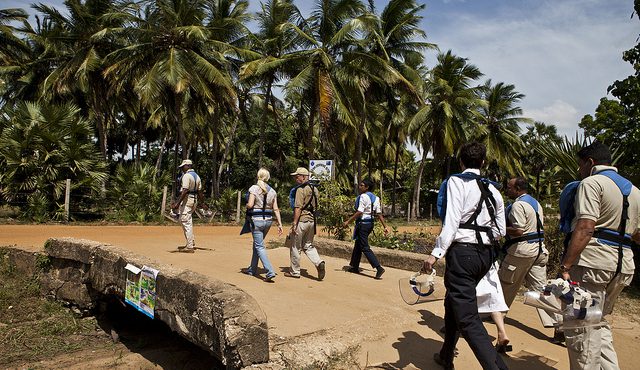
PIAC’s International Crimes Evidence Project has played a significant role in promoting accountability for alleged war crimes, crimes against humanity and other human rights violations committed in the final stages of the Sri Lankan civil war.
From 2012-2015, PIAC collected and analysed important evidentiary material from witnesses, victims and other sources relating to the conflict in Sri Lanka. PIAC conducted an independent and impartial investigation, guided by a Committee of Experts comprising some of the world’s leading experts on international criminal law, international humanitarian law and war crimes investigations.
One of the principal aims of ICEP was to provide key decision-makers, especially members of the United Nations Human Rights Council (UNHRC), with independent and credible analysis of alleged violations of international law by all parties to the civil war.
In February 2014, one month prior to the 25th session of the UNHRC in Geneva, PIAC released its landmark report, Island of Impunity? Investigation into international crimes in the final stages of the Sri Lankan civil war. PIAC found reasonable grounds to suspect that war crimes and crimes against humanity had been committed by both main parties to the civil war in Sri Lanka and called for a full international investigation.
PIAC sent a delegation to the 25th UNHRC session to brief key member states on ICEP’s findings and methodology. PIAC provided states with credible evidence and analysis so they would be better informed about the nature and extent of alleged violations committed during the war and therefore better placed to take appropriate action in response. PIAC’s report, together with the work of other civil society actors, had a significant impact. On 9 April 2014, the UNHRC adopted a resolution requesting the Office of the High Commissioner for Human Rights (OHCHR) to conduct a comprehensive investigation into alleged serious violations and abuses of human rights and related crimes in Sri Lanka during the conflict.
From April 2014 until the completion of the investigation in September 2015, PIAC provided input, analysis and assistance to the OHCHR’s Investigation on Sri Lanka (OISL). Like Island of Impunity?, the OISL’s final report found ‘there are reasonable grounds to believe that gross violations of international human rights law, serious violations of international humanitarian law and international crimes were committed by all parties during the period under investigation.’ The alleged violations include unlawful killings, enforced disappearances, torture, sexual violence, abduction and forced child recruitment, the use of human shields, indiscriminate attacks and denial of humanitarian assistance.
The final OISL report and the continued efforts of PIAC and other civil society organisations helped lead to the UNHRC adopting a landmark resolution on reconciliation, accountability and human rights in Sri Lanka on 1 October 2015. In that resolution, Sri Lanka agreed to implement a comprehensive package of transitional justice measures, including the establishment of a truth and reconciliation commission and a judicial mechanism.
Since the adoption of the October 2015 UNHRC resolution, PIAC has been working to support its full implementation and to assist the transitional justice process now underway in Sri Lanka.
Key reports and submissions :
- Island of Impunity? Investigation into international crimes in the final stages of the Sri Lankan Civil War (February 2014).
- Fact sheet – background and methodology
- Fact sheet – war crimes and crimes against humanity
- ICEP overview – French
- ICEP overview – Spanish
For further information about ICEP, please email Daniela Gavshon on [email protected]